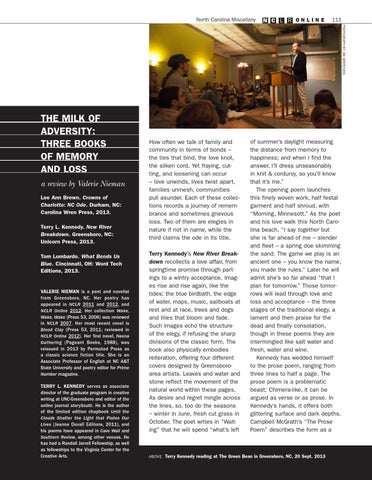North Carolina Miscellany
N C L R ONLINE
111 Photograph by Jim Whiteside;
The Milk of Adversity: Three Books of Memory and LosS a review by Valerie Nieman Lee Ann Brown. Crowns of Charlotte: NC Ode. Durham, NC: Carolina Wren Press, 2013. Terry L. Kennedy. New River Breakdown. Greensboro, NC: Unicorn Press, 2013. Tom Lombardo. What Bends Us Blue. Cincinnati, OH: Word Tech Editions, 2013.
Valerie Nieman is a poet and novelist from Greensboro, NC. Her poetry has appeared in NCLR 2011 and 2012, and NCLR Online 2012. Her collection Wake, Wake, Wake (Press 53, 2006) was reviewed in NCLR 2007. Her most recent novel is Blood Clay (Press 53, 2011; reviewed in NCLR Online 2012). Her first novel, Neena Gathering (Pageant Books, 1988), was reissued in 2013 by Permuted Press as a classic science fiction title. She is an Associate Professor of English at NC A&T State University and poetry editor for Prime Number magazine. Terry L. Kennedy serves as associate director of the graduate program in creative writing at UNC-Greensboro and editor of the online journal storySouth. He is the author of the limited edition chapbook Until the Clouds Shatter the Light that Plates Our Lives (Jeanne Duvall Editions, 2011), and his poems have appeared in Cave Wall and Southern Review, among other venues. He has had a Randall Jarrell Fellowship, as well as fellowships to the Virginia Center for the Creative Arts.
How often we talk of family and community in terms of bonds – the ties that bind, the love knot, the silken cord. Yet fraying, cutting, and loosening can occur – love unwinds, lives twist apart, families unmesh, communities pull asunder. Each of these collections records a journey of remembrance and sometimes grievous loss. Two of them are elegies in nature if not in name, while the third claims the ode in its title. Terry Kennedy’s New River Breakdown recollects a love affair, from springtime promise through partings to a wintry acceptance. Images rise and rise again, like the tides: the blue birdbath, the edge of water, maps, music, sailboats at rest and at race, trees and dogs and lilies that bloom and fade. Such images echo the structure of the elegy, if refusing the sharp divisions of the classic form. The book also physically embodies reiteration, offering four different covers designed by Greensboroarea artists. Leaves and water and stone reflect the movement of the natural world within these pages. As desire and regret mingle across the lines, so, too do the seasons – winter in June, fresh cut grass in October. The poet writes in “Waiting” that he will spend “what’s left
of summer’s daylight measuring the distance from memory to happiness; and when I find the answer, I’ll dress unseasonably in knit & corduroy, so you’ll know that it’s me.” The opening poem launches this finely woven work, half festal garment and half shroud, with “Morning, Minnesott.” As the poet and his love walk this North Carolina beach, “I say together but she is far ahead of me – slender and fleet – a spring doe skimming the sand. The game we play is an ancient one – you know the name, you made the rules.” Later he will admit she’s so far ahead “that I plan for tomorrow.” Those tomorrows will lead through love and loss and acceptance – the three stages of the traditional elegy, a lament and then praise for the dead and finally consolation, though in these poems they are intermingled like salt water and fresh, water and wine. Kennedy has wedded himself to the prose poem, ranging from three lines to half a page. The prose poem is a problematic beast: Chimera-like, it can be argued as verse or as prose. In Kennedy’s hands, it offers both glittering surface and dark depths. Campbell McGrath’s “The Prose Poem” describes the form as a
above Terry Kennedy reading at The Green Bean in Greensboro, NC, 20 Sept. 2013
